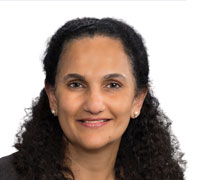I grew up in Mumbai, India, and came to this country in my late twenties. The Indian culture puts a premium value on academic achievement and college degree attainment, particularly in the areas of math and science. However, my parents instilled in me that learning itself was more important than grades. This is what I call transformative education. From a very young age, my parents taught me that in order to realize the true value of an education, it also is important to learn fine arts and language arts. This important lesson has remained with me and I have, in turn, tried to pass it on to my children.
As I look back and ponder the effect of education on my life, I can think of a few key examples of how education has shaped my life choices and eventually my career. My undergraduate education in pharmacy school in India sparked my keen interest in life sciences research. It was the driver that led to my graduate studies in pharmacology and eventually to my chosen profession. More importantly, I am convinced that my transition to the U.S. was facilitated by the transformative education I received—from my fluency in English to my knowledge about American popular culture and my respect for American values of self-reliance and hard work.
The education I received in this country also was transformational. A major distinction from the Indian university system—and the one that pleasantly surprised me—was the freedom to take any class I wanted, even if it was not a part of my core curriculum or focus. I remember taking a software programming class that took me to the fascinating world of bytes and bits rather than brain cells and biochemistry. I loved the informal learning environment where some of the professors wanted to be addressed by their first names (something unheard of in the India that I grew up in). I also was fascinated when I was exposed to my first take-home exam geared toward learning rather than grades. I remember attending seminars by Nobel laureates and prominent scientists whose research was the foundation of my own dissertation. I often reminisce about school and the research environment and wish I could go back to the freedom of learning full-time.
I would be remiss if I did not point out that education is a continuum. It happens inside and outside the classroom and throughout life, if one wants to be a lifelong learner. Countless individuals—peers, staff, supervisors, mentors and mentees—have educated me. I am forever grateful for their contribution to my knowledge. Like Michelangelo said, “I am still learning.”







Congratulations Kalpana!! Better late than never.
I found an old photo of us and I found you .
We are in Kansas
Hope you and Mahesh are doing well.
Hello to you both.
What is your son doing?
Bindu